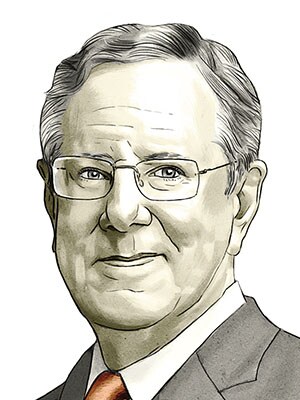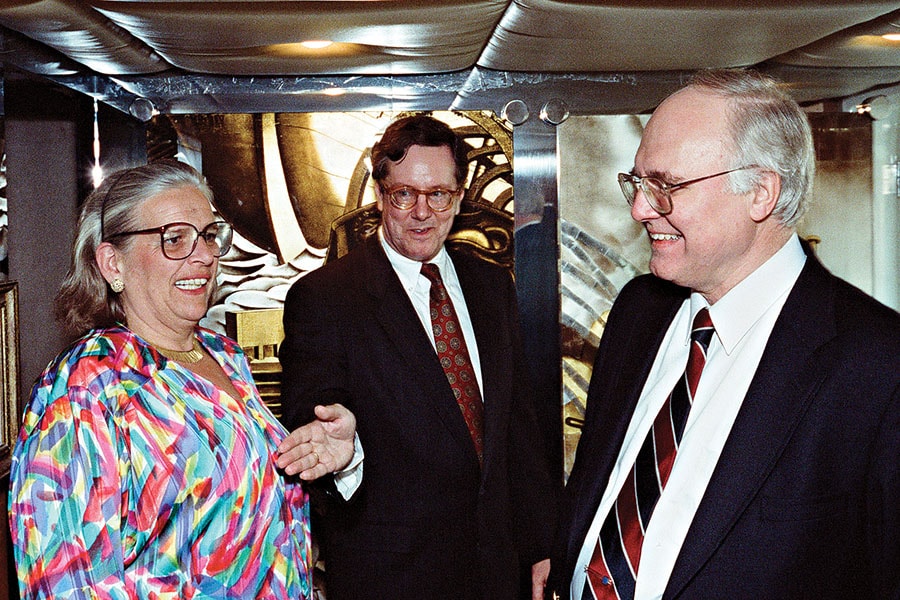
Steve Forbes: Why don't we have more billionaires?
 If governments, most especially the US’s, had pursued sensible monetary, fiscal and regulatory policies over the past 40 years, the number of global billionaires would be 20,000—ten times the 2,043 listed in this issue.
If governments, most especially the US’s, had pursued sensible monetary, fiscal and regulatory policies over the past 40 years, the number of global billionaires would be 20,000—ten times the 2,043 listed in this issue.
Wealth creation flourishes best in benign environments. Since the 1970s, bad policies have too often been the rule.
Money is the most misunderstood topic today. It is still holy writ among economists that manipulating the supply and cost of money can guide economies, the way a steering wheel does a car.
In reality, the only question about the central banks’ monetary activities is how much damage they will do. A prime example, of course, is the Federal Reserve, whose antics since the 2008–09 economic crisis have suffocated the US economy.
Money is not wealth. It facilitates the buying and selling of products and services. It measures their value the way a clock measures time. A gold standard, which the US abandoned in 1971, keeps currencies stable better than any other system. Stable money facilitates productive investing, without which we have no wealth creation.
Taxes are a burden. High rates hinder economic growth. When Europe imposed supersales taxes called value added taxes (VAT) in the late 1960s and 1970s, coupled with sky-high income taxes, growth rates plummeted.
Critical question: Will the US make Europe’s mistake by imposing a quasi-VAT of 20 percent, called the border adjustment tax? Incredibly, many Establishment Republicans are pushing this anti-working-families exaction. Economy-crushing regulations have spread like weeds. Fortunately, the Trump Administration seems serious about waging war on these tax equivalents.
Stable money, low taxes, commonsense rules. So simple. Yet, politically, so hard to achieve.
Death of an American Giant
Michael Novak, who died recently at age 83 from colon cancer, was a philosopher and theologian of the first rank. His writings on capitalism, democracy and religion had an enormous influence in the 1980s and 1990s. In fact, they provided critical intellectual underpinnings that led to the demise of Soviet communism. Ideas are the lenses through which people view the world, whether they realise it or not, and the eyeglasses Novak supplied were essential to the flowering of democracy and free-market commerce in the latter part of the 20th century and the early years of the 21st.

Kevin Lamarque / Reuters
Novak counselled Popes John Paul II and Benedict XVI on the morality of free markets. Margaret Thatcher repeatedly and generously acknowledged the impact Novak had on how she came to view the moral basis of capitalism. Novak’s books were smuggled into communist-controlled countries.
Alas, because of egregious policy errors by free-world leaders and economists in recent years, especially regarding monetary policy, capitalism is under a cloud, free trade is branded an enemy of the people and world stability is unravelling in unnerving and dangerous ways. As we saw in the 1930s and, to a lesser extent, in the 1970s, economic stagnation that seems inexplicable and impervious to the ministrations of democratically elected leaders will beget increasingly ugly consequences.
During his young years, Novak aspired to be a priest and attended a special high school at Notre Dame to prepare for it. He later abandoned that quest and, after receiving a master’s degree in the history and philosophy of religion from Harvard, pursued a life of study and political activism. He started out as a man of the left—he worked for George McGovern during his disastrous 1972 campaign against incumbent president Richard Nixon—and then rapidly gravitated rightward as he became convinced that “the left was wrong about virtually every big issue of our time”.
More impressively, Novak began to see commerce in a new light, having formerly regarded “business [as] merely buying and selling, mere hucksterism, after all”. Instead, “such hope as we have for alleviating poverty, and for removing oppressive tyranny—perhaps our last, best hope—lies in this much despised system. Capitalism teaches people to show initiative and imagination, to work cooperatively in teams, to love and to cherish the law; what is more, it forces persons not only to rely on themselves and their own moral qualities, but also to recognise those moral qualities in others and to cooperate with others freely”.
Novak had no rose-coloured view of the system. “I would not want it to be thought that any system is the Kingdom of God on Earth. Capitalism isn’t. Democracy isn’t.”
Despite commerce’s lowly, pedestrian status, he recognised that free markets enhanced humanity by encouraging, with our hardly being aware of it, interacting and working with each other in ways that produced prosperity and the opportunity for the previously oppressed to, as Lincoln put it, improve their lot in life. It gave people the chance to develop their particular talents. It encouraged a creativity that would enhance the lives of everyone. It had people looking to the future rather than to just the narrow here and now. Its end products are the opposite of greed, selfishness and miserliness—misers do not found the Microsofts, Wal-Marts and Apples of the world.
America’s Founders, Novak perceptively noted, based the new American Republic on free-market commerce because such a system attacked a sin even more deadly than hate: Envy. “Hatred... is at least visible and universally recognised as evil. Envy seldom operates under its own name; it chooses a lovelier name to hide behind, and it works like a deadly invisible gas. In previous republics, it has set class against class and sections of cities against other sections.” By contrast, in a commercial society, “when persons see that their material conditions are actually improving from year to year... they stop comparing themselves with their neighbours”.
Novak’s observations led to his classic work, The Spirit of Democratic Capitalism, a dazzling and nuanced work that made the moral case for a system that even most of its practitioners had never considered a calling or particularly exalted. Critics, particularly those on the left, were aghast at the audacity of Novak tying morality to commerce.
Too bad the current pontiff hasn’t read and absorbed the findings of this book.
I got to know this remarkable man when we served together on the Board for International Broadcasting, which was the oversight agency for Radio Free Europe (RFE) and Radio Liberty (RL). They broadcast behind what was then called the Iron Curtain, that is, the Soviet Union and its eastern and central European satellites. Novak knew that ultimately communism would be undermined via the battle of ideas. A totalitarian system depended on a monopoly of information. It was so much easier in that pre-internet, pre-mobile era to cut off whole societies from the truth. RFE, which broadcast into communist countries in eastern and central Europe, and RL, which broadcast into the Soviet Union, busted that monopoly. The radios acted like domestic broadcasters, giving news and programmes geared to local audiences. They also disseminated the writings of national dissidents. When Poland’s anti-communist Solidarity leader—and later Poland’s first post-communist president—Lech Walesa was asked about the role of RFE in bringing down communism in Poland, he responded, “What is the Earth without the Sun?”
It’s no surprise that the Kremlin hated RFE/RL and worked hard to undermine them, both directly, by trying to jam their broadcasts, and indirectly, by undermining political support for them in Washington (“These provocateurs stand in the way of better relations between our great countries!”) and in western Europe, from where they did their programming and broadcasting.
Novak vigorously supported the work of RFE/RL for personal (he was of Slovak descent) and ideological reasons. He was extremely helpful with programming ideas and in dealing with the often combustible relations among radio employees who hailed from various nations and held strong opinions about everything. Novak was also no naïf when it came to the ways of Washington’s congressional and bureaucratic politics. This was critical, because the radios were under constant assault from what in those days were called anti-anti-communists and a State Department that was always trying to steal our money and independence.
During those years, we loved hearing Novak’s original and insightful observations on a whole host of subjects, from politics to religion to sports (he, like yours truly, loved baseball). What was also inspiring to all those who knew Novak was the deep love he and his wife, Karen (a gifted artist who died in 2009), had for each other.
Michael Novak’s voice will be especially missed in these anxious times.
Steve Forbes is Editor-in-Chief, Forbes
(This story appears in the 30 November, -0001 issue of Forbes India. To visit our Archives, click here.)





